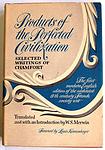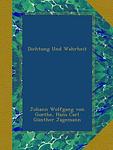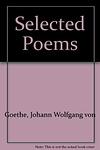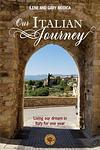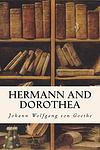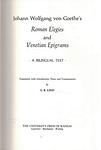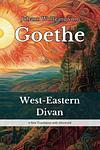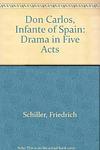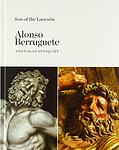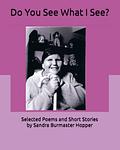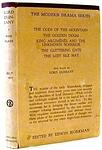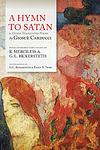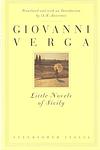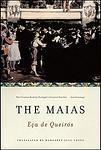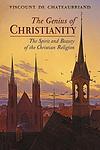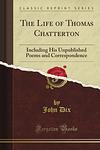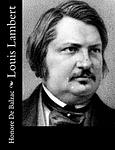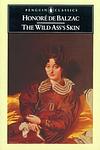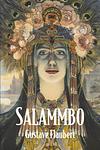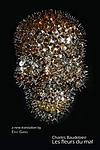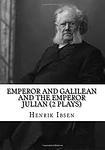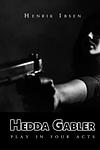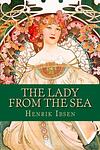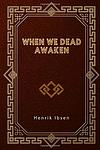Harold Bloom's The Western Canon
This is one of the 300 lists we use to generate our main The Greatest Books list.
-
The Princess of Cleves by Madame de La Fayette
Set in the royal court of Henry II of France, the novel follows the life of a beautiful young woman, newly presented at court, who attracts the attention of many suitors, including the King's son. However, she is married off to a man she does not love, the Prince of Cleves. Despite her loyalty to her husband, she falls in love with the Duke of Nemours. The novel explores themes of duty, honor, and the conflict between passion and reason as the protagonist struggles with her feelings and the moral implications of her love for the Duke.
The 365th Greatest Book of All Time -
Products Of The Perfected Civilization by Sébastien-Roch Nicolas de Chamfort
"Products of the Perfected Civilization" is a collection of aphorisms, maxims, and reflections that delve into the ironies and contradictions of society, morality, and human behavior. The work offers a critical and often cynical look at the nature of man, the flaws of aristocratic society, and the pretenses of enlightenment and progress. Through sharp wit and concise language, the author exposes the hypocrisies of his time, questioning the very notion of a 'perfected' civilization and suggesting that beneath the veneer of culture and refinement often lies a core of vanity, folly, and vice.
The 5265th Greatest Book of All Time -
Rameau's Nephew by Denis Diderot
"Rameau's Nephew" is a philosophical dialogue that explores themes of morality, societal norms, and the nature of genius. The story revolves around a conversation between a philosopher and a character who is the nephew of a famous musician. The nephew, a freeloader and a parasite, defends his lifestyle by arguing that it is not only acceptable but also necessary in a society where wealth and power determine value. The dialogue delves into the contradictions and ironies of social conventions, challenging traditional notions of virtue, vice, and human nature.
The 1640th Greatest Book of All Time -
Dangerous Liaison by Pierre Choderlos de Laclos
"Dangerous Liaison" is a tale of manipulation, revenge, and seduction set in the French aristocracy before the French Revolution. The novel follows the Marquise de Merteuil and the Vicomte de Valmont, two rivals who use sex as a weapon to humiliate and degrade others, all the while enjoying their cruel games. Their targets are the virtuous (and married) Madame de Tourvel and the young Cecile de Volanges. The book is a dramatic exploration of decadence, corruption, and ultimate retribution.
The 210th Greatest Book of All Time -
The Praise of Folly by Erasmus
This satirical work is a critique of the practices of the Church and the wider social behavior of the time. Narrated by Folly, the female personification of foolishness, the book humorously criticizes various aspects of society such as superstitious religious practices, scholarly pedantry, and the excesses of the upper classes. The book is a bold critique of its time, using humor and irony to expose the follies of its society.
The 777th Greatest Book of All Time -
Faust by Johann Wolfgang von Goethe
The book is a tragic play in two parts that tells the story of a scholarly man named Faust, who becomes dissatisfied with his life and makes a pact with the devil, Mephistopheles. In exchange for unlimited knowledge and worldly pleasures, Faust agrees to give his soul to Mephistopheles after death. The narrative explores themes of ambition, despair, love, and redemption, ultimately leading to Faust's salvation.
The 84th Greatest Book of All Time -
Dichtung Und Wahrheit by Johann Wolfgang von Goethe
This autobiographical work offers a rich and introspective account of the author's early life, intellectual development, and the cultural milieu of the late 18th and early 19th centuries. It delves into his formative experiences, relationships, and the evolution of his thoughts and literary career. The narrative not only provides insights into the author's personal journey but also reflects on the broader human experience, exploring themes of truth, art, and the interplay between personal reality and creative expression. Through a blend of poetic storytelling and philosophical musings, the book presents a nuanced exploration of the shaping of an individual's identity and the forces that influence the creative process.
The 4143rd Greatest Book of All Time -
Egmont by Johann Wolfgang von Goethe
"Egmont" is a tragic play set in the 16th-century Spanish-occupied Netherlands, focusing on the life of a nobleman who becomes a hero among the Dutch people for his resistance against the oppressive Spanish rule. The protagonist's political and romantic involvements lead him into conflict with the Spanish authorities, culminating in his arrest and execution. Despite his tragic end, his sacrifice becomes a symbol of national resistance and inspires a successful uprising against the foreign dominators. The play explores themes of freedom, tyranny, and the personal costs of political engagement, blending historical drama with romantic elements.
The 7152nd Greatest Book of All Time -
Elective Affinities by Johann Wolfgang von Goethe
This novel explores the romantic relationships and social dynamics of four characters: a married couple, their close friend, and a young girl who becomes part of the household. The story is a study of how people's choices, passions, and societal norms can shape their relationships, often with tragic consequences. The narrative delves into themes of marriage, love, morality, and the intersection of personal feelings with societal expectations.
The 1176th Greatest Book of All Time -
The Sorrows of Young Werther by Johann Wolfgang von Goethe
This classic novel follows the emotional journey of a young artist named Werther, who falls deeply in love with a beautiful woman named Lotte, only to discover that she is already engaged to another man. His unrequited love and deep despair eventually lead him to take his own life. The story, told through letters written by Werther, explores themes of love, loss, and the tragic consequences of emotional turmoil.
The 288th Greatest Book of All Time -
Poems Of Johann Wolfgang Von Goethe by Johann Wolfgang von Goethe
This collection encapsulates the lyrical genius of one of Germany's most revered literary figures, offering a diverse selection of poetry that spans themes of love, nature, and the human condition. The poems reflect the author's profound insight into the complexities of the soul and the beauty of the world around him, showcasing his mastery of language and his ability to evoke deep emotion and contemplation. The work is a testament to the enduring power of poetic expression and the timeless relevance of the author's reflections on life and art.
The 7152nd Greatest Book of All Time -
Wilhelm Meister's Apprenticeship by Johann Wolfgang von Goethe
"Wilhelm Meister's Apprenticeship" is a classic coming-of-age story that follows the protagonist, Wilhelm, through his journey of self-discovery. Caught between his bourgeois background and his aspirations to become an actor, Wilhelm embarks on an odyssey that introduces him to a variety of characters and experiences. The novel explores themes of love, loss, and the pursuit of artistic excellence, while also critiquing the social norms and expectations of the time.
The 892nd Greatest Book of All Time -
Italian Journey by Johann Wolfgang von Goethe
The book is a classic travel memoir that chronicles the author's journey through Italy from 1786 to 1788. During his travels, he explores the rich cultural heritage, art, and history of the country, seeking to understand the influence of classical antiquity and the Renaissance on contemporary European thought. The narrative is a blend of personal reflections, detailed descriptions of the landscapes, cities, and people he encounters, as well as musings on art and literature. The author's experiences in Italy mark a significant period of personal growth and intellectual development, profoundly impacting his subsequent literary work and contributing to the broader European cultural movement known as Weimar Classicism.
The 5265th Greatest Book of All Time -
Verse Plays by Johann Wolfgang von Goethe
The book is a collection of dramatic works written in verse by the renowned German literary figure. These plays showcase the author's versatility and mastery in blending classical and romantic elements within the theatrical form. The content ranges from explorations of mythological themes to humanistic inquiries, all unified by the author's poetic language and philosophical depth. The plays within this compilation are celebrated for their lyrical beauty and intellectual rigor, reflecting the author's profound understanding of the human condition and his ability to translate complex ideas into compelling dramatic narratives.
The 7152nd Greatest Book of All Time -
Hermann And Dorothea by Johann Wolfgang von Goethe
This classic narrative poem tells the story of two young people, Hermann and Dorothea, who find love amidst the turmoil of war. Set against the backdrop of the French Revolution's impact on Germany, the poem explores themes of duty, community, and the personal transformations that arise from political upheaval. Hermann, the son of a prosperous innkeeper, initially sets out to aid refugees fleeing the conflict and encounters Dorothea, a strong and principled woman among them. Their relationship develops as they navigate the challenges of their time, ultimately leading to a union that symbolizes hope and the enduring human spirit in the face of adversity.
The 7152nd Greatest Book of All Time -
Roman Elegies by Johann Wolfgang von Goethe
"Roman Elegies" is a collection of twenty-four poems that celebrate the classical heritage of ancient Rome while reflecting on contemporary European society. The poems are notable for their eroticism and the personal nature of their content, as they delve into the author's own experiences and emotions during his time in Italy. Through a blend of personal reflection and homage to the ancient world, the work explores themes of love, art, and the human experience, blending the sensual with the intellectual. The elegies are a testament to the author's passion for classical culture and his mastery of poetic form, as well as his ability to infuse his verse with both the depth of his scholarly interests and the intensity of his personal feelings.
The 7152nd Greatest Book of All Time -
Venetian Epigrams by Johann Wolfgang von Goethe
"Venetian Epigrams" is a collection of short, incisive poems that reflect the author's observations and experiences during a stay in Venice. Written with a blend of wit, irony, and lyrical beauty, the epigrams delve into themes such as love, sexuality, art, and the nature of society. The author's sharp commentary on the Venetian way of life, as well as his personal reflections on human relationships and the pursuit of pleasure, are presented in a concise and often provocative manner, revealing the depth of his engagement with the culture and the vibrancy of the city that inspired him.
The 7152nd Greatest Book of All Time -
West Eastern Divan by Johann Wolfgang von Goethe
The book in question is a collection of lyrical poems that reflects the author's fascination with Persian culture, inspired by the works of the Persian poet Hafez. It serves as a poetic dialogue that bridges Western and Eastern cultural traditions, exploring themes of love, wine, and the nuanced interplay between nature, humanity, and the divine. The work is notable for its attempt to transcend cultural barriers and promote understanding between the Occident and the Orient, showcasing the author's deep appreciation for the richness of Middle Eastern literature and philosophy.
The 7152nd Greatest Book of All Time -
The Robbers by Friedrich Schiller
"The Robbers" is a dramatic tale of conflict between two aristocratic brothers, Karl and Franz Moor. Karl, the elder, is deeply idealistic but becomes an outlaw after being falsely led to believe he has lost his father's love and his inheritance due to his brother's machinations. Meanwhile, Franz, the younger brother, is a scheming villain who manipulates their father and seeks to consolidate power and wealth for himself. The play explores themes of justice, family loyalty, and the nature of good and evil as Karl leads a band of rebels against the societal corruption he despises, only to find that his quest for justice is fraught with moral ambiguity and personal tragedy.
The 7152nd Greatest Book of All Time -
Mary Stuart by Friedrich Schiller
The play delves into the tragic life of the titular character, a former queen who finds herself imprisoned and facing execution at the hands of her cousin, the reigning monarch of England. It explores themes of power, betrayal, and the struggle for sovereignty, as the protagonist confronts her impending fate with dignity and courage. The narrative unfolds through a series of intense encounters with various historical figures, each revealing the complex web of political intrigue and personal vendettas that sealed her doom. The play ultimately serves as a poignant examination of the human cost of political rivalry and the inexorable march of history.
The 6950th Greatest Book of All Time -
Wallenstein by Friedrich Schiller
The book is a dramatic trilogy that delves into the complex life and times of a prominent figure during the Thirty Years' War, a European conflict that spanned from 1618 to 1648. It explores the rise and fall of the titular character, a powerful and ambitious general who commands the Imperial forces of the Holy Roman Emperor. The narrative examines themes of power, loyalty, and betrayal as the general navigates the treacherous political landscape, ultimately facing a tragic downfall due to his overreaching ambition and the machinations of his enemies. The work is a rich tapestry of historical drama and personal conflict, reflecting on the nature of authority and the consequences of hubris.
The 7152nd Greatest Book of All Time -
Don Carlos: Infante of Spain, a Drama in Five Acts by Friedrich Schiller
"Don Carlos: Infante of Spain, a Drama in Five Acts" is a historical play that portrays the intense political and personal conflicts within the Spanish royal court. The story revolves around Don Carlos, the son of King Philip II of Spain, who is in love with his stepmother, Queen Elisabeth of Valois. The narrative also introduces Marquis Posa, a nobleman who advocates for freedom, and becomes a confidant to both Don Carlos and the King. The play explores themes of love, power, freedom, and betrayal, culminating in a tragic ending.
The 4475th Greatest Book of All Time -
On The Naïve And Sentimental In Literature by Friedrich Schiller
This philosophical treatise explores the dual nature of artistic creation, distinguishing between two types of poets: the 'naïve,' who are characterized by natural simplicity and an unconscious alignment with the harmony of the natural world, and the 'sentimental,' who are reflective, self-aware, and driven by a sense of separation from that ideal state of nature. The author delves into the aesthetics and psychology behind these classifications, examining how each type interprets and represents reality through their work. The text serves as a profound inquiry into the complexities of human emotion, the creative process, and the ongoing dialogue between an artist's inner world and external reality.
The 7152nd Greatest Book of All Time -
Laocoön by Gotthold Lessing
The book in question is a seminal work in the field of aesthetics and art criticism that explores the differences between painting and poetry. Through a detailed examination of the ancient sculpture of Laocoön and the related texts, the author argues that visual arts and literature operate under different rules and are best suited to different kinds of expression. The author posits that while painting uses shapes and colors in space to depict a single moment in time, poetry unfolds over time and uses language to describe a sequence of actions, thus allowing for the depiction of more complex narratives. This distinction is famously encapsulated in the discussion of the "pregnant moment" in visual arts, which captures the most telling moment of a story, and the dynamic progression of events in literature.
The 7152nd Greatest Book of All Time -
Nathan the Wise by Gotthold Ephraim Lessing
"Nathan the Wise" is a 18th-century play that explores religious tolerance and interfaith understanding. The story is set in Jerusalem during the Third Crusade and revolves around Nathan, a wealthy Jewish merchant, who is renowned for his wisdom and generosity. The narrative explores themes of religious tolerance as Nathan interacts with a Templar knight, a Christian patriarch, and the Muslim sultan Saladin. The story culminates with the revelation that the main characters, despite their different faiths, are all part of the same family, thus promoting a message of shared humanity and religious coexistence.
The 4474th Greatest Book of All Time -
Hymns And Fragments by Freidrich Hölderlin
This book is a collection of lyric poetry that delves into the profound depths of human experience, intertwining the personal with the mythic and the natural world. The poems reflect a deep engagement with the philosophical and aesthetic ideas of the time, exploring themes of beauty, transcendence, and the divine. The poet's intense relationship with nature and the ancient Greek tradition is evident, as is his struggle with mental illness, which adds a poignant layer to the work. The verses oscillate between jubilant celebration of the divine in the ordinary and a melancholic yearning for a lost unity with the cosmos, offering a rich tapestry of emotional and intellectual contemplation.
The 8320th Greatest Book of All Time -
Selected Poems by Freidrich Hölderlin
"Selected Poems" is a compilation of lyrical works by a prominent German poet, known for his profound influence on modern poetry. The collection showcases a range of his poetic output, characterized by a deep engagement with nature, the divine, and the ancient Greek world. His verses often reflect a tension between the beauty of the world and a sense of alienation from it, blending classical themes with a pioneering use of language and form. The poet's work is marked by a passionate intensity and a quest for spiritual meaning, offering readers a glimpse into the transformative power of poetry to explore the depths of human experience and emotion.
The 7152nd Greatest Book of All Time -
Five Plays by Heinrich von Kleist
"Five Plays" is a collection of dramatic works by a renowned German playwright, showcasing a range of themes from personal tragedy to political satire. The plays within this anthology are known for their intense emotionality, complex characters, and exploration of moral and philosophical dilemmas. The playwright's unique style combines classical forms with a sense of modernity, often leading to abrupt and surprising plot twists. The plays challenge conventional morality and social norms, reflecting the author's preoccupation with the conflicts between individual desires and societal expectations, as well as the often tragic consequences of these tensions.
The 7152nd Greatest Book of All Time -
On Sepulchres by Ugo Foscolo
"On Sepulchres" is a seminal essay that delves into the cultural and emotional significance of tombs and the act of remembering the dead. The author passionately argues for the preservation of sepulchres as a means to honor and remember the contributions of illustrious individuals to their society and culture. By reflecting on the historical and personal importance of these memorials, the essay advocates for the creation of national monuments to serve as everlasting tributes to the virtues and achievements of the deceased, thereby inspiring the living and fostering a sense of national identity and continuity.
The 7152nd Greatest Book of All Time -
Last Letters Of Jacopo Ortis by Ugo Foscolo
The book is a poignant epistolary novel that delves into the emotional turmoil of a young Italian intellectual, torn between his passionate love for a woman and his despair over the political situation in his homeland. As he grapples with unrequited love and the loss of his country's freedom following its annexation by a foreign power, the protagonist's letters reveal his deepening melancholy and his philosophical reflections on love, death, and patriotism. The novel, rich in its exploration of human emotions and national identity, ultimately leads to a tragic conclusion, reflecting the author's own disillusionment with the political climate of his time.
The 7152nd Greatest Book of All Time -
Odes And The Graces by Ugo Foscolo
"Odes and the Graces" is a collection of lyric poetry that delves into themes of love, beauty, and classical antiquity, reflecting the author's deep appreciation for the Hellenistic cultural heritage. The poems are characterized by their passionate and sometimes melancholic tone, as they explore the transient nature of life and the enduring power of art. The poet's reverence for the ancient world is evident in his allusions to mythological figures and the Graces, who symbolize the giving of charm and beauty, serving as an inspiration for the pursuit of intellectual and aesthetic ideals in a world marked by political turmoil and change.
The 7152nd Greatest Book of All Time -
The Betrothed by Alessandro Manzoni
"The Betrothed" is a historical novel set in Lombardy, Italy during the 17th century, in the midst of political and religious turmoil. The story follows the journey of two peasants, Renzo and Lucia, who are in love and wish to marry. However, their plans are thwarted by a corrupt local baron who desires Lucia for himself, and a cowardly priest who refuses to stand up to the baron. The couple are forced to flee, facing numerous hardships and adventures, while their faith and love for each other are continually tested. The novel explores themes of love, faith, and the struggle for justice.
The 479th Greatest Book of All Time -
On The Historical Novel by Alessandro Manzoni
The book in question is a critical examination of the historical novel as a literary genre, exploring the challenges and responsibilities of blending historical facts with fictional narrative. The author delves into the intricacies of accurately representing historical events and characters while crafting a compelling story that remains true to the era it depicts. Through a series of essays, the work discusses the importance of historical context, the role of the author's perspective, and the balance between didacticism and entertainment in creating novels that not only depict the past but also resonate with contemporary readers. The text serves as both a guide for writers of historical fiction and a critique of the genre, offering insights into the ethical and artistic considerations involved in writing about history.
The 7152nd Greatest Book of All Time -
Essays And Dialogues by Giacomo Leopardi
"Essays and Dialogues" is a collection of philosophical writings that delve into the author's musings on the human condition, society, and the nature of happiness. The work is known for its profound pessimism and critical examination of the Enlightenment's optimistic view of progress. Through a series of essays and fictional conversations, the author explores themes such as the limitations of human knowledge, the inevitability of suffering, and the fleeting nature of pleasure. The text is a reflection of the author's erudition and his deep engagement with classical literature, which he uses to articulate a vision of life that is at once bleak and deeply insightful, challenging readers to confront the more somber aspects of existence.
The 7152nd Greatest Book of All Time -
Complete Poems of Giacomo Leopardi by Giacomo Leopardi
This book is a comprehensive collection of the poetic works of a renowned Italian poet. The poems cover a wide range of themes, from love and nature to philosophy and social issues, showcasing the poet's profound understanding of human nature and the world. The collection also includes his celebrated "Canti" and other lesser-known works, all presented in their original Italian language, making it a valuable resource for those interested in Italian literature and culture.
The 836th Greatest Book of All Time -
Roman Sonnets by Giuseppe Gioacchino Belli
"Roman Sonnets" is a collection of poetic works that delve into the life and culture of 19th-century Rome through the lens of its common people. The sonnets are written in Romanesco, the local dialect of Rome, which adds authenticity and depth to the portrayal of the city's inhabitants. The poems are known for their satirical and often irreverent tone, as they critique social norms, religious hypocrisy, and the struggles of the lower classes. Through vivid characters and sharp wit, the sonnets paint a rich, albeit unvarnished, picture of Roman society, capturing the essence of its everyday life and the spirit of its people.
The 7152nd Greatest Book of All Time -
Hymn To Satan by Giosué Carducci
The poem in question is a controversial and iconoclastic work that pays homage to Satan as a symbol of rebellion and human progress. Through a series of vivid and provocative images, the poem challenges traditional religious and moral beliefs, praising Satan as the embodiment of reason, beauty, and the force that has spurred humanity to break free from the chains of ignorance and superstition. The work reflects the author's critical view of the Church and his admiration for the spirit of the Renaissance and the Enlightenment, celebrating the pursuit of knowledge and the liberation of the human spirit.
The 7152nd Greatest Book of All Time -
Barbarian Odes by Giosué Carducci
"Barbarian Odes" is a collection of lyric poetry that celebrates the beauty of the Italian landscape, the richness of its history, and the poet's own personal experiences and emotions. The work is infused with classical references and a passionate spirit of nationalism, reflecting the poet's reverence for the ancient past and his aspirations for Italy's cultural and political rejuvenation. The odes are characterized by their bold, energetic style and their embrace of life's sensual pleasures, while also contemplating themes of love, nature, and the passage of time. This collection represents a significant contribution to the canon of Italian literature, blending the classical tradition with a modern sensibility.
The 7152nd Greatest Book of All Time -
Rhymes And Rhythms by Giosué Carducci
"Rhymes and Rhythms" is a collection of poetry that delves into the themes of nature, love, and classical antiquity, reflecting the author's passion for the beauty of the Italian landscape and his reverence for the ancient world. The poems are characterized by their musicality and formal precision, showcasing the poet's mastery of traditional verse forms and his ability to evoke vivid imagery and emotion. Through his work, the poet engages with the political and cultural issues of his time, while also exploring personal introspection and the universal human experience, making his poetry both a reflection of the era in which he lived and a timeless exploration of the poetic spirit.
The 7152nd Greatest Book of All Time -
Little Novels Of Sicily by Giovanni Verga
The book is a collection of short stories that delve into the lives of Sicilian peasants and fishermen in the late 19th century, offering a vivid portrayal of their daily struggles, passions, and traditions. Through a series of evocative narratives, the work captures the essence of rural Sicilian life, with its harsh realities and simple joys, while also exploring universal themes of love, honor, and the inexorable forces of change. The author's masterful use of regional dialect and keen observation of human nature render a poignant and authentic picture of a world where the beauty of the landscape contrasts sharply with the toil and hardships of its inhabitants.
The 7152nd Greatest Book of All Time -
Mastro Don Gesualdo by Giovanni Verga
The book is a poignant tale set in 19th-century Sicily, following the life of a self-made man who rises from peasant origins to wealth and status through hard work and marriage. Despite his success, he struggles with societal acceptance and personal fulfillment, as his newfound position brings neither the respect of the aristocracy nor the love of his wife. The narrative delves into themes of social mobility, the rigid class structures of Italian society, and the ultimate emptiness of material success without personal connections, painting a vivid picture of the protagonist's tragic quest for recognition and happiness.
The 7152nd Greatest Book of All Time -
I Malavoglia by Giovanni Verga
"I Malavoglia" is a tragic tale of a poor Sicilian family who struggles to maintain their dignity and values in the face of poverty, death, and societal pressure. The family's patriarch is determined to keep their ancestral home and to improve their lot through hard work and sacrifice. However, their efforts are thwarted by a series of unfortunate events, including the loss of their fishing boat, the death of family members, and the dishonor of their only daughter. Despite these hardships, the family perseveres, embodying the resilience and determination of the Sicilian people.
The 1188th Greatest Book of All Time -
The She Wolf And Other Stories by Giovanni Verga
"The She Wolf and Other Stories" is a collection of vivid and emotionally intense short stories that delve into the lives of peasants and fishermen in 19th-century Sicily. The narratives, characterized by their realism and concise prose, explore themes of poverty, passion, and the struggle for survival in a changing world. The titular story, "The She-Wolf," stands out as a powerful tale of a fiercely independent and manipulative woman who embodies both the allure and the dangers of untamed nature. Through these stories, the book offers a window into the harsh realities of rural Sicilian life, highlighting the human condition and the social dynamics of the time.
The 7152nd Greatest Book of All Time -
Poems Of Gustavo Adolpho Bécquer by Gustavo Adolpho Bécquer
This collection of poetry delves into the romantic and mystical realms, capturing the essence of human emotions and the beauty of love, longing, and despair. The verses are characterized by their lyrical intensity and profound sentimentality, often reflecting on themes of unrequited love, the ephemeral nature of life, and the pursuit of ideal beauty. The poet's work is renowned for its simplicity and musicality, resonating with the soul's deepest yearnings and the universal quest for understanding the ineffable mysteries of the heart and existence.
The 7152nd Greatest Book of All Time -
Fortunata and Jacinta by Benito Pérez Galdós
"Fortunata and Jacinta" is a novel set in 19th century Spain, that explores the lives of two women - Fortunata, a poor but beautiful woman, and Jacinta, a wealthy and well-bred lady. Both women are in love with the same man, a wealthy and idle individual who leads a life of debauchery. The novel offers a rich and detailed portrayal of Madrid society during the period, and the stark contrast between the lives of the rich and the poor. It raises questions about marriage, social status, and the role of women in society.
The 775th Greatest Book of All Time -
La Regenta by Clarín
"La Regenta" is a classic of Spanish literature that takes place in a small provincial town and centers around the character of Ana Ozores, a married woman who becomes the object of desire for two very different men: the town's liberal Casanova and a conservative, ambitious priest. The narrative explores themes of religion, hypocrisy, and forbidden love in a repressed society. The author's detailed depiction of the town and its inhabitants provides a vivid backdrop for the tragic love triangle that unfolds.
The 646th Greatest Book of All Time -
The Maias: Episodes from Romantic Life by Eça de Queirós
"The Maias: Episodes from Romantic Life" is a compelling narrative set in Lisbon in the late 19th century that follows the lives of a wealthy Portuguese family, the Maias. The story centers around the romantic and professional life of Carlos Maia, but also includes a rich cast of secondary characters. The plot includes themes of love, betrayal, disillusionment, and tragedy, all set against the backdrop of a rapidly changing Portuguese society. The novel is also a critique of the decadence and stagnation of Portuguese society at the time.
The 1137th Greatest Book of All Time -
Adolphe by Benjamin Constant
"Adolphe" is a semi-autobiographical novel that tells the story of a young man, Adolphe, who falls in love with an older woman, Ellénore. The novel explores the complexities and consequences of their illicit love affair, as Adolphe struggles with his feelings and societal expectations. The story delves into themes of love, power, freedom, and the individual versus society, offering a profound psychological and moral insight into human nature.
The 1172nd Greatest Book of All Time -
The Red Notebook by Benjamin Constant
The novel in question revolves around the protagonist's introspective journey through his own memories and emotions, as he reflects on his passionate and tumultuous love affair with an enigmatic woman. Through a series of diary entries, the protagonist delves into the depths of his psyche, exploring themes of obsession, self-deception, and the complexities of the human heart. The narrative unfolds as a candid examination of the protagonist's inner turmoil and the impact of his intense romantic experiences on his personal growth and understanding of love.
The 7152nd Greatest Book of All Time -
Atala by François-Auguste-René de Chateaubriand
"Atala" is a romantic novella set in the wilderness of the American South, blending the natural landscape with the tragic love story of its protagonists. The narrative follows Chactas, a Native American man, who recounts his youthful love affair with Atala, a half-European, half-Native American woman. Their love is challenged by cultural differences and Atala's vow of chastity, which she made to her mother. The story is imbued with themes of passion, religion, and the noble savage, and it reflects on the conflict between duty and desire. Ultimately, the novella is a poignant exploration of forbidden love and the sacrifices made in its name, set against the backdrop of a disappearing natural world and the encroachment of European civilization.
The 7152nd Greatest Book of All Time -
René by François-Auguste-René de Chateaubriand
"René" is a seminal work of French Romantic literature that delves into the emotional turmoil and philosophical reflections of its eponymous protagonist, a young, disenchanted aristocrat. The novella explores themes of nature, solitude, and existential despair as René grapples with a profound sense of melancholy and a feeling of being out of step with society. His internal struggles and search for meaning lead him to the American wilderness, where encounters with indigenous peoples and the untamed landscape prompt deeper introspection. The narrative is a poignant examination of the individual's quest for authenticity and the pervasive sense of alienation that can accompany a sensitive and introspective soul in a world that seems indifferent to its deeper yearnings.
The 2760th Greatest Book of All Time -
The Genius Of Christianity by François-Auguste-René de Chateaubriand
The book is a comprehensive defense and celebration of the Christian faith, arguing that Christianity is not only a source of moral and spiritual guidance but also a driving force for cultural and artistic excellence. The author presents Christianity as the foundation of Western civilization, attributing to it the genius behind its laws, customs, and institutions. He explores the religion's influence on literature, fine arts, and societal values, suggesting that the beauty and sublimity found in Christian doctrine, rituals, and symbolism have profoundly shaped human creativity and sentiment. The work serves as both an apologetic treatise and a romantic homage to the aesthetic and cultural contributions of Christianity throughout history.
The 7152nd Greatest Book of All Time -
Poetic Meditations by Alphonse de Lamartine
"Poetic Meditations" is a collection of lyrical poetry that delves into the profound depths of human emotion, nature, and existential contemplation. The work is characterized by its romantic sensibility, with the poet exploring themes of love, beauty, melancholy, and the transient nature of life. Through vivid imagery and a deep connection with the natural world, the poems reflect on personal experiences and universal truths, offering readers a chance to engage in introspective reflection. The poet's masterful use of language and rhythm invites an appreciation for the musicality of verse, while considering the philosophical questions that have long captivated the human spirit.
The 7152nd Greatest Book of All Time -
Chatterton by Alfred de Vigny
The book is a historical novel that delves into the life and tragic fate of Thomas Chatterton, an 18th-century English poet who was posthumously recognized for his talent. The narrative explores themes of artistic integrity, the struggle for recognition, and the impact of societal neglect on creative genius. Through the lens of Chatterton's short and tumultuous life, the novel examines the romantic ideal of the misunderstood and impoverished artist, ultimately providing a critique of the ways in which society both venerates and marginalizes its creators. The protagonist's passionate pursuit of literary authenticity and his eventual despair are depicted with a blend of empathy and melancholy, reflecting on the eternal conflict between the artist's inner world and the external realities of survival and acceptance.
The 2761st Greatest Book of All Time -
Poems Of Alfred De Vigny by Alfred de Vigny
This collection is an anthology of lyrical works by a prominent French poet, known for his profound and melancholic reflections on the human condition, love, and society. The poems delve into themes of solitude, the passage of time, and the poet's quest for meaning in a world marked by suffering and noble stoicism. The poet's mastery of form and his philosophical musings are evident throughout the collection, which stands as a testament to his significant contribution to the Romantic literary movement in 19th-century France.
The 7152nd Greatest Book of All Time -
The Distance, The Shadows by Victor Hugo
"The Distance, The Shadows" is a poignant exploration of the human condition, delving into themes of love, loss, and the inexorable passage of time. Set against a backdrop of social upheaval, the narrative weaves together the lives of disparate characters, each struggling with their own inner demons and societal constraints. The novel's rich tapestry of emotion and philosophical musings paints a vivid picture of the struggle between the light of hope and the darkness of despair, as the characters navigate the distances between their dreams and realities, and the shadows that fall upon their paths. Through its intricate storytelling, the book examines the enduring question of what it means to be human in a world fraught with challenges and change.
The 7152nd Greatest Book of All Time -
Complete Poems Of Alfred De Musset by Alfred de Musset
The collection presents the complete poetic works of a renowned 19th-century French writer, showcasing a diverse range of themes from romance to melancholy, and from societal critique to personal introspection. The poems reflect the author's mastery of lyrical expression and his preoccupation with the complexities of love, the passage of time, and the struggles of the human spirit. His verse is characterized by its emotional depth, rhythmic elegance, and the interplay between classical form and romantic content, offering readers a profound insight into the literary movement of his time as well as the timeless nature of human experience.
The 7152nd Greatest Book of All Time -
Lorenzaccio by Alfred de Musset
The play is a dramatic tale set in Renaissance Florence, revolving around the character of Lorenzo de Medici, a young, disillusioned aristocrat entangled in the corrupt political machinations of his time. Disgusted by the tyrannical rule of his cousin, Duke Alessandro, and the moral decay of society, Lorenzo hatches a complex plot to assassinate the Duke. His internal conflict and the influence of Machiavellian philosophy drive the narrative, exploring themes of power, betrayal, and the struggle between personal ideals and the harsh realities of the political world. The play ultimately unfolds as a dark, psychological drama that delves into the depths of human nature and the costs of radical action.
The 3026th Greatest Book of All Time -
The Chimeras by Gérard de Nerval
"The Chimeras" is a collection of sonnets that delves into the realms of mythology, history, and personal introspection, weaving a tapestry of allegorical and symbolic imagery. The work reflects the author's fascination with the occult, the dreamlike, and the struggle between idealism and reality. Through the use of classical references and a deeply personal voice, the poems explore themes of love, despair, and the search for transcendence, offering a poignant look at the human condition and the poet's own troubled psyche. The sonnets stand as a testament to the author's lyrical prowess and his ability to find beauty amidst the shadows of his own mental turmoil.
The 7152nd Greatest Book of All Time -
Sylvie by Gérard de Nerval
"Sylvie" is a novella that blends memory, dream, and reality, telling the story of a narrator's romantic entanglements with three women: the eponymous Sylvie, a pastoral beauty from his childhood; Aurélie, an actress who represents his present infatuation; and Adrienne, a figure from a chivalric past. As the narrator oscillates between these women and the times they represent, he embarks on a quest for idealized love, only to confront the illusions of nostalgia and the fleeting nature of his desires. The narrative is a poignant exploration of time, memory, and the unattainable, set against the backdrop of the French countryside and the evocative ruins of a bygone era.
The 7152nd Greatest Book of All Time -
Aurelia by Gérard de Nerval
"Aurelia" is a semi-autobiographical narrative blending reality with dreamlike visions, where the protagonist embarks on a profound and surreal journey through his psyche following a descent into madness. The work is a poignant exploration of the author's own experiences with mental illness, unrequited love, and existential anguish. It delves into themes of the supernatural, the occult, and the interplay between dreams and waking life, as the narrator seeks to reconcile his internal turmoil and find a deeper understanding of his soul and the universe. The narrative is rich with symbolic imagery and introspective passages that reflect the author's fascination with the mystical and his quest for spiritual transcendence.
The 7152nd Greatest Book of All Time -
Mademoiselle De Maupin by Théophile Gautier
The novel revolves around the adventures of its eponymous heroine, a daring and passionate young woman who defies the constraints of her time by assuming a male identity. Disguised as a man, she explores the freedoms and limitations of both genders, engaging in sword fights, romantic escapades, and philosophical debates about love and sexuality. Throughout her journey, she becomes the object of affection for both men and women, challenging the societal norms of 19th-century France and offering a provocative critique of gender roles and the nature of desire. The narrative, rich in poetic language and vivid descriptions, delves into the complexities of identity and the true essence of beauty and love.
The 4143rd Greatest Book of All Time -
Enamels And Cameos by Théophile Gautier
"Enamels and Cameos" is a collection of poetry that showcases the author's mastery of language and deep appreciation for beauty, both in art and in the natural world. The poems are characterized by their vivid imagery, precise language, and the evocation of classical themes and forms. The author's work reflects a fascination with the past and a penchant for capturing the essence of his subjects with the meticulousness of a jeweler. The pieces range from sonnets to longer, more complex compositions, each one a polished gem that explores themes of love, death, and the transcendent power of art.
The 7152nd Greatest Book of All Time -
The Girl With The Golden Eyes by Honoré de Balzac
The novella delves into the decadent world of Parisian society, exploring themes of lust, power, and the corrupting influence of wealth. It follows a young man of high social standing who becomes infatuated with a mysterious woman with captivating golden eyes. As he pursues her, he uncovers a web of deception and jealousy, revealing the woman's entrapment by a powerful guardian with sinister intentions. The story is a critique of the French aristocracy and the moral decay hidden behind the opulent facades of Paris during the Restoration period.
The 7152nd Greatest Book of All Time -
Louis Lambert by Honoré de Balzac
The book is a philosophical and semi-autobiographical novel that delves into the life of a precocious and highly intelligent boy who becomes the author's classmate in a provincial boarding school. The boy's profound metaphysical and philosophical musings, influenced by the works of Swedenborg and other mystics, set him apart from his peers and lead him on a quest for transcendental knowledge. As he grows older, his intense intellectual pursuits and his love for a woman named Pauline strain his mental health, ultimately leading to his retreat from society and descent into what is perceived as madness. The novel explores themes of genius, the conflict between materialism and spirituality, and the nature of the human soul.
The 7152nd Greatest Book of All Time -
The Wild Ass's Skin by Honoré de Balzac
The novel revolves around a young, impoverished Parisian named Raphaël de Valentin who stumbles upon a magical piece of donkey skin that grants him the power to fulfill any desire at the cost of shortening his life with each wish. As he grapples with this Faustian bargain, Raphaël is torn between his ambitions and the fear of death, embarking on a journey of indulgence and introspection. The narrative explores themes of fate, materialism, and the human condition, ultimately questioning whether the pursuit of happiness and the fulfillment of desires can truly lead to contentment.
The 1912th Greatest Book of All Time -
Father Goriot by Honoré de Balzac
"Father Goriot" is a classic French novel that explores the themes of wealth, power, love, and social status in 19th century Paris. The narrative follows the lives of three main characters: a young, ambitious law student who seeks to rise above his modest background; an elderly, once-wealthy man who has sacrificed everything for his two ungrateful daughters; and a crafty, ruthless criminal who manipulates others for his own gain. Their stories intertwine in a boarding house, revealing the harsh realities of Parisian society and the destructive power of unchecked ambition and selfishness.
The 206th Greatest Book of All Time -
Cousin Bette by Honoré de Balzac
"Cousin Bette" is a novel set in mid-19th century Paris, focusing on the lives of the Hulot family and their cousin, Bette, an old maid who harbors a deep resentment towards her relatives due to their wealth and social status. When Bette learns that her cousin's husband is having an affair, she decides to exact revenge by manipulating various characters and situations, leading to the downfall of the Hulot family. The novel explores themes of jealousy, revenge, and the destructive power of repressed feelings.
The 490th Greatest Book of All Time -
A Harlot High And Low by Honoré de Balzac
The novel delves into the underbelly of Parisian society, following the life of a cunning and ambitious protagonist who navigates the treacherous waters of crime and power. As a sequel to a previous work, it continues to explore themes of social climbing and moral ambiguity, presenting a complex web of characters from different social strata, including a high-class courtesan whose fortunes rise and fall dramatically. The narrative weaves a tale of deception, love, and betrayal, offering a critical look at the corruption and hypocrisy of 19th-century France, while also examining the intricate relationships between money, politics, and social status.
The 4677th Greatest Book of All Time -
Eugenie Grandet by Honoré de Balzac
"Eugenie Grandet" is a classic French novel that explores the life of a wealthy and miserly provincial businessman and his daughter, Eugenie. The father's obsession with wealth and his refusal to spend any of it leads to a life of hardship for Eugenie, who is in love with her penniless cousin. The novel delves into themes of wealth, love, sacrifice, and the complexities of human nature, shedding light on the oppressive social norms of 19th-century French provincial life.
The 539th Greatest Book of All Time -
Ursule Mirouet by Honoré de Balzac
The novel revolves around the life of Ursule Mirouet, a gentle and devout orphan raised by her godfather, Doctor Minoret, in the town of Nemours. As the doctor's wealth and Ursule's prospects of inheritance become apparent, she becomes the target of her jealous and greedy relatives who conspire to discredit her and claim the fortune for themselves. The story delves into themes of greed, family conflict, and the supernatural, as Ursule's life is influenced by mesmerism and visions that guide her through her trials. Ultimately, it is a tale of virtue rewarded and vice punished, set against the backdrop of provincial French society in the 19th century.
The 7152nd Greatest Book of All Time -
On Love by Stendhal
The book is a philosophical inquiry into the nature of love, drawing upon the author's personal experiences as well as historical and fictional examples. It dissects romantic attraction, detailing the process of crystallization where ordinary perceptions are transformed into idealized notions of the beloved. The work explores various types of love, from passionate physical attraction to vanity-driven affection, and delves into the psychological aspects of desire, jealousy, and the pursuit of happiness within romantic relationships. The author's analysis offers a blend of cynical and passionate perspectives, reflecting on the complexities and contradictions inherent in love.
The 7152nd Greatest Book of All Time -
The Red and the Black by Stendhal
The novel is a detailed psychological portrait of Julien Sorel, a young man from a provincial background who aspires to rise above his humble beginnings. He uses his intelligence and hypocrisy to advance in the post-Napoleonic French society, which is deeply divided by class and political loyalties. The story is a critique of the society's materialism and hypocrisy as Julien's ambitions lead him to a tragic end. The title refers to the contrasting uniforms of the army and the church, the two routes available to him for upward mobility.
The 52nd Greatest Book of All Time -
The Charterhouse of Parma by Stendhal
The novel follows the life of a young Italian nobleman, who, driven by romantic ideals and a thirst for adventure, leaves his comfortable life to join Napoleon's army. After surviving many trials and tribulations, he returns home to a life of political intrigue, love affairs, and power struggles in the court of Parma. The narrative provides a vivid and satirical depiction of the political and social life in Italy during the 19th century.
The 240th Greatest Book of All Time -
Madame Bovary by Gustave Flaubert
Madame Bovary is a tragic novel about a young woman, Emma Bovary, who is married to a dull, but kind-hearted doctor. Dissatisfied with her life, she embarks on a series of extramarital affairs and indulges in a luxurious lifestyle in an attempt to escape the banalities and emptiness of provincial life. Her desire for passion and excitement leads her down a path of financial ruin and despair, ultimately resulting in a tragic end.
The 19th Greatest Book of All Time -
A Sentimental Education by Gustave Flaubert
A Sentimental Education is a classic French novel set in the mid-19th century, focusing on the life of a young man named Frederic Moreau. Frederic, from a provincial background, moves to Paris and becomes infatuated with an older woman, Madame Arnoux. The novel traces Frederic's life and romantic pursuits, as well as his friendships and experiences in Paris, against the backdrop of significant historical events like the 1848 Revolution. The story is a critique of the French middle class and their materialistic values, illustrating the disillusionment and moral corruption of the time.
The 262nd Greatest Book of All Time -
Salammbô by Gustave Flaubert
Set in ancient Carthage during the Mercenary War, the novel follows the tumultuous events that ensue after the First Punic War, as unpaid mercenary soldiers rebel against the wealthy city they once fought for. Amidst the backdrop of political intrigue and brutal warfare, a passionate and tragic love story unfolds between the beautiful and enigmatic daughter of a Carthaginian general and the leader of the mercenaries. The narrative is rich with historical detail, vivid depictions of exotic rituals, and the violent ebb and flow of power, culminating in a dramatic and bloody resolution that intertwines the fates of the city, the mercenaries, and the star-crossed lovers.
The 7152nd Greatest Book of All Time -
A Simple Soul by Gustave Flaubert
The book tells the story of Félicité, a devoted and selfless servant who spends her life working for her mistress, Madame Aubain. Despite experiencing personal losses and hardships, including the death of her beloved nephew and the loss of her parrot, Félicité's simple and pure heart remains uncorrupted by the bitterness of her circumstances. Her life is marked by her remarkable loyalty and deep affection for those she serves, and her story is a poignant exploration of the themes of love, devotion, and the search for spiritual fulfillment in the face of life's relentless challenges.
The 7152nd Greatest Book of All Time -
The Haunted Pool by George Sand
"The Haunted Pool" is a French pastoral novel that delves into the supernatural and the complexities of human emotions. Set in a bucolic countryside, the story revolves around a mysterious pool believed to be haunted by a spirit. The narrative follows the lives of the local villagers whose fates intertwine with the enigmatic presence of the pool. Themes of love, jealousy, and the conflict between rationality and superstition are explored as the characters confront their deepest fears and desires, ultimately leading to a resolution that blends the mystical with the moral lessons of the tale.
The 7152nd Greatest Book of All Time -
The Flowers of Evil by Charles Baudelaire
"The Flowers of Evil" is a collection of poems that explore themes of decadence and eroticism, and the changing nature of beauty in the rapidly industrializing Paris during the 19th century. The work is renowned for its exploration of the paradoxes of pleasure and pain, the exotic and the commonplace, and the boundaries of morality and aesthetics. The poems challenge traditional notions of good and evil, suggesting that beauty can be found in unexpected and even disturbing places.
The 287th Greatest Book of All Time -
Paris Spleen by Charles Baudelaire
The book is a seminal work in the history of prose poetry, capturing the modern urban experience through a series of short, lyrical pieces. It delves into the psychological landscape of the city, exploring themes of melancholy, ennui, and the search for beauty amidst the squalor of Parisian life in the mid-19th century. The author's sharp observations and vivid imagery reflect his complex relationship with the city, oscillating between a deep love for its vibrant culture and a profound sense of alienation. This collection of prose poems is considered a touchstone for modernist literature, influencing generations of writers and poets with its innovative style and introspective depth.
The 1789th Greatest Book of All Time -
Selected Poetry And Prose by Stéphane Mallarmé
This collection is a curated anthology of works by a pivotal French symbolist poet, renowned for his complex, innovative verse and prose writings that explore themes of reality, perception, and the power of language. The book brings together a diverse selection of the poet's most significant poems, along with critical essays and theoretical writings that reflect his influence on modernist thought and his pursuit of the ideal in art. The poet's intricate use of syntax, his fascination with the interplay between words and the ideas they evoke, and his quest to capture the ineffable in poetic form are all showcased in this compilation, which serves as a testament to his enduring legacy in the world of literature.
The 7152nd Greatest Book of All Time -
Selected Poems Of Paul Verlaine by Paul Verlaine
This collection brings together a curated selection of poetry from a renowned French poet, known for his musical language and the evocation of melancholic themes through impressionistic verse. The poems traverse a range of emotions and experiences, reflecting the poet's turbulent life, including his romantic liaisons and struggles with inner demons. The work is emblematic of the Symbolist movement, with its emphasis on suggestion and nuance rather than explicit description, and it has had a profound influence on the development of modern poetry. Through his innovative use of rhythm, wordplay, and imagery, the poet captures the fleeting moods and nuances of life, leaving a lasting impression on the reader with his delicate and poignant verse.
The 7152nd Greatest Book of All Time -
Complete Works by Arthur Rimbaud
The book is a comprehensive collection of the revolutionary works of a French poet known for his influence on modern literature and arts, particularly among the Symbolists and Surrealists. Written during an astonishingly brief period of creative output that ended by the time the poet was 21, the anthology includes a variety of poems, letters, and prose pieces. These works are characterized by their vibrant imagery, exploration of the subconscious, and rebellion against traditional poetic forms and bourgeois society. The poet's intense and tumultuous life is reflected in his writing, which continues to inspire and challenge readers with its innovation and raw emotional power.
The 7152nd Greatest Book of All Time -
Les Armours Jaunes by Tristan Corbière
"Les Amours Jaunes" is a collection of poems that delves into the themes of love, disillusionment, and the struggles of the human condition. The work is known for its satirical edge and its use of irony, often employing a cynical tone to critique contemporary society and its norms. The poet's unique voice combines a mix of traditional and innovative verse, characterized by its vivid imagery and linguistic playfulness. This collection reflects the author's rebellious spirit and his disdain for romanticism, offering a raw, unidealized perspective on life and love.
The 7152nd Greatest Book of All Time -
Selected Writings by Jules Laforgue
"Selected Writings" is a compilation of works by a pioneering French symbolist poet, known for his innovative use of free verse and a conversational tone that broke from the formal traditions of 19th-century French poetry. The collection showcases the author's melancholic and ironic style, blending a sense of personal disillusionment with a detached observation of society. His poems often reflect on themes of ennui, existential despair, and the absurdity of life, while also experimenting with language and poetic form. This anthology serves as a testament to the poet's influence on modernist literature and his role in shaping the direction of modern poetry.
The 7152nd Greatest Book of All Time -
Stories of Guy de Maupassant by Guy de Maupassant
This book is a collection of short stories from a renowned French author, known for his masterful storytelling and keen observations of human nature. The narratives delve into various aspects of life, from love and loss to morality and deception, showcasing the author's ability to capture the complexity of human emotions and experiences. His stories often carry a cynical tone, reflecting the harsh realities of life, and are noted for their surprise endings.
The 715th Greatest Book of All Time -
Germinal by Émile Zola
The novel is a bleak and realistic portrayal of coal miners' lives in 19th century France. The protagonist, a young man who starts work in a mine, becomes embroiled in the hardship and exploitation faced by the workers, leading to his involvement in a strike. The story explores themes of poverty, social injustice, and the struggle for workers' rights, while also providing a detailed depiction of mining life, from the dangerous work conditions to the close-knit communities.
The 349th Greatest Book of All Time -
L'assommoir by Émile Zola
The novel is a gritty portrayal of working-class life in 19th-century Paris, focusing on the struggles of Gervaise Macquart, a laundress who aspires to a better life. After her lover abandons her with two children, she marries a roofer, Coupeau, and they initially find happiness and modest prosperity. However, their lives spiral downward due to alcoholism, poverty, and the harsh realities of their social environment. The narrative delves into the impact of addiction on family dynamics and the broader community, painting a vivid and unflinching picture of the urban poor's descent into despair and degradation.
The 1198th Greatest Book of All Time -
Nana by Émile Zola
"Nana" is a novel that follows the life of a young woman in 19th century France who rises from the streets to become a high-profile courtesan. Her physical charm and manipulative nature allow her to maintain control over her high-status lovers, leading them to financial ruin and even death. The novel is a critique of the moral decay of the French society, highlighting the destructive power of lust and greed.
The 1461st Greatest Book of All Time -
Brand by Henrik Ibsen
The play revolves around the story of a stern and idealistic priest who lives in the harsh, unforgiving climate of rural Norway. The protagonist is unwavering in his religious and moral convictions, refusing to compromise on his ideals even when faced with personal tragedy and the suffering of those around him. His rigid adherence to principle leads him to make decisions that have devastating effects on his own life and the lives of the community members. The narrative explores themes of sacrifice, the conflict between duty and compassion, and the quest for true Christian living in a flawed world. Ultimately, the protagonist's journey is a tragic reflection on the cost of absolute integrity.
The 6951st Greatest Book of All Time -
Peer Gynt by Henrik Ibsen
The play follows the adventures of its eponymous hero, a boastful and irresponsible Norwegian peasant who embarks on a series of fantastical and often selfish escapades. Throughout his life's journey, he encounters various mythical creatures, engages in business ventures, and pursues romantic interests, all while evading responsibility and the consequences of his actions. His quest for self-realization and identity takes him around the world, only to lead him back home to confront the reality of his wasted life and the love he scorned. The play is a poetic and satirical critique of the Romantic hero and delves into themes of existentialism, self-deception, and the nature of true self-fulfillment.
The 2074th Greatest Book of All Time -
Emperor And Galilean by Henrik Ibsen
"Emperor and Galilean" is a historical drama that centers on the life of the Roman Emperor Julian the Apostate, who reigned in the 4th century. The play explores Julian's internal conflict as he attempts to revive pagan worship in the face of the growing influence of Christianity. As Julian becomes increasingly disillusioned with Christian doctrine, he seeks to establish a new world order based on a synthesis of Greek philosophy and pagan gods. His quest for spiritual and political transformation leads him on a tragic journey, culminating in his ultimate failure and realization of the futility of his ambitions. The narrative delves into themes of power, faith, and the human struggle between the divine and earthly realms.
The 7152nd Greatest Book of All Time -
Hedda Gabler by Henrik Ibsen
"Hedda Gabler" is a dramatic play that centers on the life of its titular character, a woman trapped in a loveless marriage with a dull, reliable husband. She is bored with her life and longs for freedom and excitement. Her desire for control and power leads her to manipulate those around her, resulting in tragic consequences. The play explores themes of societal expectations, personal freedom, and the destructive power of boredom.
The 1489th Greatest Book of All Time -
The Master Builder by Henrik Ibsen
"The Master Builder" is a play focused on the life of Halvard Solness, a successful yet self-absorbed architect who is haunted by past mistakes and fears the rise of a younger generation. His life takes a turn when a young woman, Hilda, arrives, reminding him of a promise he made to her a decade ago. As Solness grapples with his past, present, and future, the play explores themes of ambition, power, guilt, and the cost of success.
The 4803rd Greatest Book of All Time -
The Lady From The Sea by Henrik Ibsen
The play centers around Ellida Wangel, a lighthouse-keeper's daughter who is trapped in an unhappy marriage with Dr. Wangel. She is haunted by her past and her mysterious attachment to a seafaring stranger who once promised to return for her. As she grapples with her longing for the sea and her duty to her family, the play explores themes of freedom, choice, and the powerful pull of one's origins. When the stranger reappears, Ellida must confront her desires and decide whether to remain on land with her husband and stepdaughters or to yield to the call of the sea and the life she once knew.
The 7152nd Greatest Book of All Time -
When We Dead Awaken by Henrik Ibsen
"When We Dead Awaken" is a dramatic play that revolves around the story of a renowned sculptor who encounters his muse from the past, leading to a profound reevaluation of his life and work. As he grapples with the realization that his artistic success has come at the expense of genuine human connection and passion, the play delves into themes of artistic integrity, lost love, and the quest for redemption. The narrative unfolds in a series of intense encounters and conversations, culminating in a climactic moment that forces the characters to confront the consequences of their choices and the transient nature of life and art.
The 7152nd Greatest Book of All Time -
To Damascus by August Strindberg
"To Damascus" is a semi-autobiographical play that follows the spiritual journey of the protagonist, known as the Stranger, who embarks on a quest for meaning and redemption. Struggling with guilt, doubt, and a sense of existential despair, he encounters various symbolic characters, including the Confessor and the Lady, who represent different aspects of his psyche and philosophical challenges. The play delves into themes of faith, suffering, and the search for truth, as the Stranger's pilgrimage reflects the author's own introspective exploration of personal crisis and spiritual awakening. Set against the backdrop of turn-of-the-century Europe, the work is a complex blend of psychological drama and religious allegory, illustrating the profound inner conflicts and transformative experiences of its central figure.
The 7152nd Greatest Book of All Time -
Miss Julie by August Strindberg
"Miss Julie" is a classic play that delves into the themes of class, love, and power. The story revolves around the daughter of a Count who, in a moment of passion, becomes involved with her father's valet. This scandalous affair leads to a tumultuous power struggle between the two characters, ultimately resulting in tragedy. The narrative explores the dynamics of gender and class in the late 19th century, revealing the societal constraints that lead to the characters' downfall.
The 2754th Greatest Book of All Time -
The Father by August Strindberg
"The Father" is a dramatic play that explores the battle of the sexes through the lens of a dysfunctional family. The story centers on a military captain and his wife as they engage in a power struggle over the future of their daughter. The wife manipulates everyone around her to convince them that her husband is insane, leading to tragic consequences. The narrative delves deep into themes of gender roles, power dynamics, and the nature of truth.
The 3188th Greatest Book of All Time
The Western Canon (Book) by Harold Bloom, 1501 Books
The Western Canon: The Books and School of the Ages is a 1994 book about Western literature by the American literary critic Harold Bloom, in which the author defends the concept of the Western canon by discussing 26 writers whom he sees as central to the canon.
The Western Canon includes four appendices listing works that Bloom at the time considered canonical, stretching from the earliest scriptures to Tony Kushner's Angels in America. Bloom later disowned the list, saying that it was written at his editor's insistence and distracted from the book's intention.
In adding this list, I did expand certain titles into multiple books, and combined some, since some are single short stories. This was a difficult list to add since there are so many books.
This list has a weight of 30%. To learn more about what this means please visit the Rankings page.
Here is a list of what is decreasing the importance of this list:
- Voters: 1 person voted
- List: only covers mostly "Western Canon" books
- List: contains over 500 books(Quantity over Quality)
If you think this is incorrect please e-mail us at [email protected].

